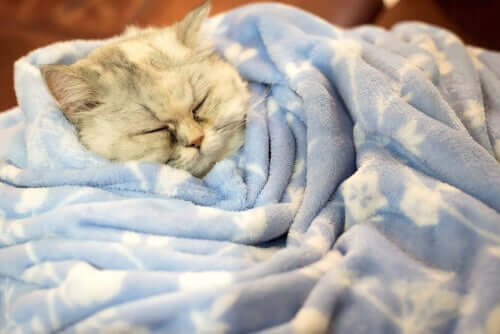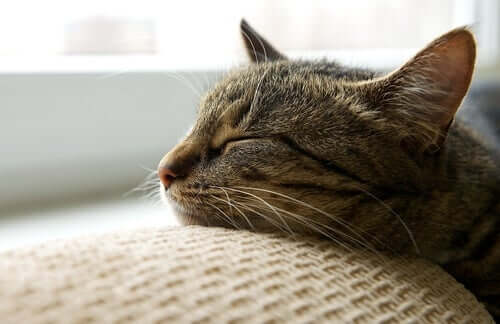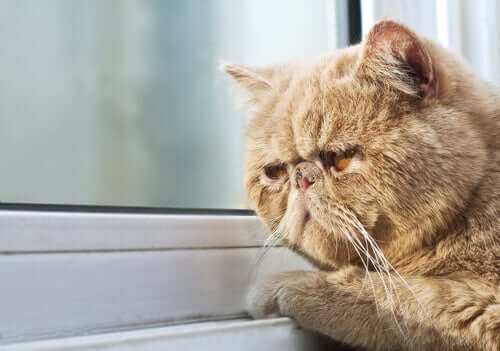Discover the Truth: Do Cats Hibernate in the Winter?

Although it’s not always noticeable, animals change their habits in order to adapt to new temperature changes. All of us have heard about animals that hibernate. And, at the same time, we can observe how our domestic pets change their activity when it’s cold outdoors. So this leads us to ask ourselves certain questions: Why does my cat sleep so much? Do cats hibernate in the winter?
In the winter, animals need to burn off less energy in all of their activities. Additionally, finding food when it’s cold outdoors is much more difficult. In response to these circumstances, some species maintain their energy by hibernating.
Is it true that cats hibernate in the winter?
Hibernation involves much more than sleeping. An animal’s body undergoes a number of drastic physiological changes. For instance, its body temperature reduces so much that it almost matches the temperature of the environment.
What’s more, the heart rate and frequency of breathing in animals that hibernate drops drastically. During hibernation, animals experience a reduced state of consciousness. In other words, they are not aware of their surroundings.
Domestic cats, however, have no need to hibernate. In our homes, they get all of the food they need and enjoy comfortable indoor temperatures.

Why are cats less active during the winter?
Many cat owners suspect that their pets hibernate during the winter because they observe them sleeping more often. Of course, sleeping a lot is common in cats during any time of year. However, some affirm that their feline friends sleep even more when it’s cold outside.
If you’ve noticed the same in your cat, there’s no need to worry. Even human beings tend to be less active and feel much lazier during the winter. It’s normal! Just the same, it’s a good idea for cat owners to make a point to involve their cats in fun indoor activities. This will help prevent obesity and keep your cat from feeling bored when temperatures are low.
But what about cats that live in the wild?
Stray cats and wild cats can survive the winter months thanks to the fact that they possess thicker fur. While specialists affirm that these cats don’t hibernate like many other wild mammals and other species. However, they may undergo a certain temporary sort of hibernation that lasts for hours. This is known as lethargy.
While in a lethargic state, cats experience a reduced metabolic rate and a lower body temperature.
During lethargy, a body’s metabolism comes to a halt for short periods over the course of the day. This strategy allows cats to maintain their normal body temperature during the day while they carry out habitual activities.
The importance of knowing your cat well
Just like human beings, every individual cat is unique. Some felines are more sensitive to the cold and others are more prone to suffering during the summer. Of course, certain general sleeping patterns do exist. However, for each species, the details vary according to the specific needs of each pet. What’s more, external factors can change an animal’s behavior.

Mood disorders in cats
It’s a well-known fact that some human beings can suffer from seasonal affective disorder (SAD) during the cold, grey winter months. This condition is characterized by symptoms of depression.
While no formal diagnosis of this disorder exists when it comes to cats, we can still observe similar symptoms. Veterinarians and cat fanatics claim to notice that some cats seem sadder and less playful during the winter.
Cats may display changes in their energy levels, appetite, sleep patterns, and temperament when they experience less exposure to light.
How can I improve my cat’s mood during the winter?
Fortunately, there’s a lot you can do to help improve your cat’s mood during the winter. Regardless of whether or not cats actually hibernate in the winter, making simple changes can have a positive influence on your cat’s behavior:
- Encourage activity: This will keep your cat from spending so much time sleeping. Offer your cat new toys or hand a bird feeder to attract birds to a window. You can even simply place several boxes around the house for your pet to explore. It’s important that you minimize stress as much as possible.
- Exposure to light: Make sure to open the curtains so that light gets into your home. Natural sunlight is very important when it comes to a cat’s state of mind. You can also place a small lamp close to where your cat sleeps.
- Respond appropriately to temperature changes: Make sure that your cat has warm places to hang out. For example, a heated cat bed, a spot near a sunny window, or a cozy place near a heat vent.
- Pay attention to your cat’s eating habits: Just like humans, cats can eat just because they’re bored. Keep a close eye on how often and how much your cat eats.
All cited sources were thoroughly reviewed by our team to ensure their quality, reliability, currency, and validity. The bibliography of this article was considered reliable and of academic or scientific accuracy.
- Jensen, R. A., Davis, J. L., & Shnerson, A. (1980). Early experience facilitates the development of temperature regulation in the cat. Developmental Psychobiology: The Journal of the International Society for Developmental Psychobiology, 13(1), 1-6.
- Refinetti, R., & Menaker, M. (1992). The circadian rhythm of body temperature. Physiology & behavior, 51(3), 613-637.
- Tellería,J.L. (1987). Zoología evolutiva de los vertebrados., pp. 145-155 (Síntesis, Madrid).
- Hudson, J.W. (1973). Torpidity in mammals. In Comparative Physiology of Thermoregulation, Academic Press, Pages 97-165. https://doi.org/10.1016/B978-0-12-747603-2.50009-6.
